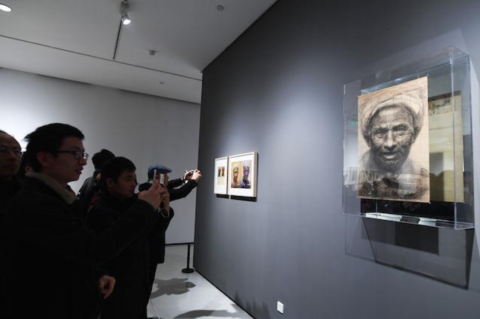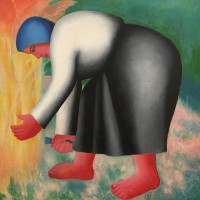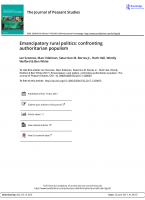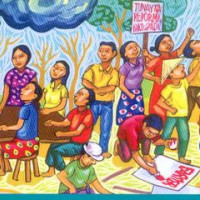Confronting authoritarian populism: the rural dimension
Religion, gender dynamics, place and cultural identity – all inform rising authoritarian populism in rural areas, alongside class interests and inequalities. Mobilising alternatives to capture by regressive political forces is not straightforward.

Authoritarian populism is on the rise. Whether in Brazil, Hungary, India, Indonesia, the Philippines, South Africa, Turkey, France, the US and many other countries. Regressive, nationalist, sometimes with religious inflections, it is a diverse, global phenomenon.
Much has been written about the rise of authoritarian populism, not least on openDemocracy. But there has been relatively scant analysis of its specific roots and impacts in rural areas.
We launched the Emancipatory Rural Politics Initiative to fill this gap. ERPI aims to explore how and why authoritarian populism emerges in diverse rural worlds globally, and how it can be confronted. In March, several hundred researchers and activists will meet in The Hague to discuss experiences and ways forward. Our aim is both analytical and practical: to understand and also actively to seek alternatives.
Despite the deluge of commentary on the rise of populist politics, too often analyses resort to simplistic and sweeping generalisations about the rural dimensions: rural people as the ‘somewheres’, without a cosmopolitan outlook; rural people as the ‘victims’ of the ravages of post-industrial capitalism; rural places as where undifferentiated inward-looking ‘communities’ exist.
What then is authoritarian populism? We draw on the arguments of Stuart Hall and others who were analysing the emergence of Thatcherism. In the terms of Antonio Gramsci, authoritarian populisms can emerge when the ‘balance of forces’ changes, creating a new ‘political-ideological conjuncture’. Drawing on populist discontents, a ‘transformist’, authoritarian movement, often with a strong, figurehead leader, is launched, mobilising around ‘moral panics’ and ‘authoritarian closure’, being given, in Hall’s words, ‘the gloss of populist consent’.
While this sounds very familiar, today is of course not the 1980s. The forces of capitalism and the contours of politics have changed. Financialisation in particular defines contemporary capitalism, with major impacts in rural areas, as speculative investments fuel resource grabs and dispossession across the world.
Equally, many now challenge the unquestioned ‘common sense’ that rampant hyper-globalisation just had to be accommodated, with the worst effects mitigated by social programmes. Instead, populists challenge globalisation with nationalist rhetoric, as economies and politics look inwards.
Yet the reasons why authoritarian regimes gain support in rural areas are complex. Class, gender, race, generation, place and other identities are all important.
These are affected in turn by histories of capitalism, conflicts and exploitation in agrarian settings, and the often ambivalent relationships between the state and the countryside: all bound up in what Chantal Mouffe refers to as the ‘agonistic’ politics across divided groups.
Three distinguishing features of rural worlds
What then can help us understand authoritarian populisms in rural worlds? Three things stand out.
First are the histories and consequences of the recent period of neoliberal globalisation. This has had different impacts on different places and for different people, and so gives rise to different political reactions. As Dani Rodrik explains, whether authoritarian or progressive populism emerges very much depends on particular histories of globalization. Populist politics may centre on ethno-nationalist objections to migration or, from a progressive perspective, arise from the impacts of global trade and investment or deindustrialization on working people’s livelihoods.
The rural dimensions of this are important: whether migrants and minorities are welcomed or shunned will depend on cultural histories and the structures of rural economies. How globalization has affected rural livelihoods will equally depend on how rural and urban spaces are connected, and who benefits and who loses.
Neoliberal globalization has thus had contrasting implications for class, race, caste, gender and age – and so for processes of rural political mobilization. In many rural regions, communities have been hollowed out as small farms and other businesses face increasing competition, industries close, young people leave for urban areas, social pathologies spread, and local institutions — cooperatives, credit unions, sports clubs, schools — weaken or collapse. In many rural settings, it’s no surprise that the appeal of authoritarian, nationalist populism is strong.
Rural resources
Second, the extractive exploitation of rural resources continues apace. Particularly since the global financial and food crisis of 2008, the grabbing of land, water or minerals has been reshaping rural spaces in many parts of the world, as finance capital seeks new returns.
In some cases, armed conflict contributes to the dispossession and displacement. In many countries rural resource extraction is now being pursued with a more nationalist tinge, with arguments about ‘national interest’ in relation to energy, food or water securities. With new capital-elite-state alliances, the dynamics of accumulation shift, and with this comes a new politics of displacement.
Populist arguments for new investments, jobs and growth in rural areas easily appeal to those who have been left behind. Yet the capture of land and resources may result in territorial and environmental destruction and in new exclusions and dispossessions. Simply arguing that resource grabbing is bad is not enough: alternative, inclusive visions for rural economies are needed that also bring livelihood opportunities in often poor, neglected regions.
Reactionary identity politics
Third, in order to foster resistance and garner alternatives, the emergence of authoritarian populism, with a strong rural base, needs a careful, sympathetic analysis of why is it that young people, women, peasant farmers and others are often swayed by such reactionary politics. As Nancy Fraser argues, we need to think about the intersecting politics of identity, belonging, recognition and redistribution.
Rural religion, gender dynamics, place and cultural identity are important alongside class interests and inequalities. Mobilising alternatives to the easy capture by regressive political forces is not straightforward. New campaigns and narratives are required that go beyond simplistic appeals to ‘community’, empathetic individualism and localist ‘sovereignties’.
Lots of new economic activities are emerging in rural areas, based on principles of communing, mutualism and care. But how to connect these, moving beyond the isolated and experimental, and link them to each other and to emancipatory political alliances?
These are some of the challenges we are discussing across the ERPI network, now involving researchers, practitioners and activists from over fifty countries. In the forthcoming blogs and our reports on our March event, we will be examining what is happening in particular places, and how authoritarian populism, in its diverse forms, is being confronted. Please join the conversation!
This is the first in a series of openDemocracy articles that explores these questions, based on emerging research from around the world.






